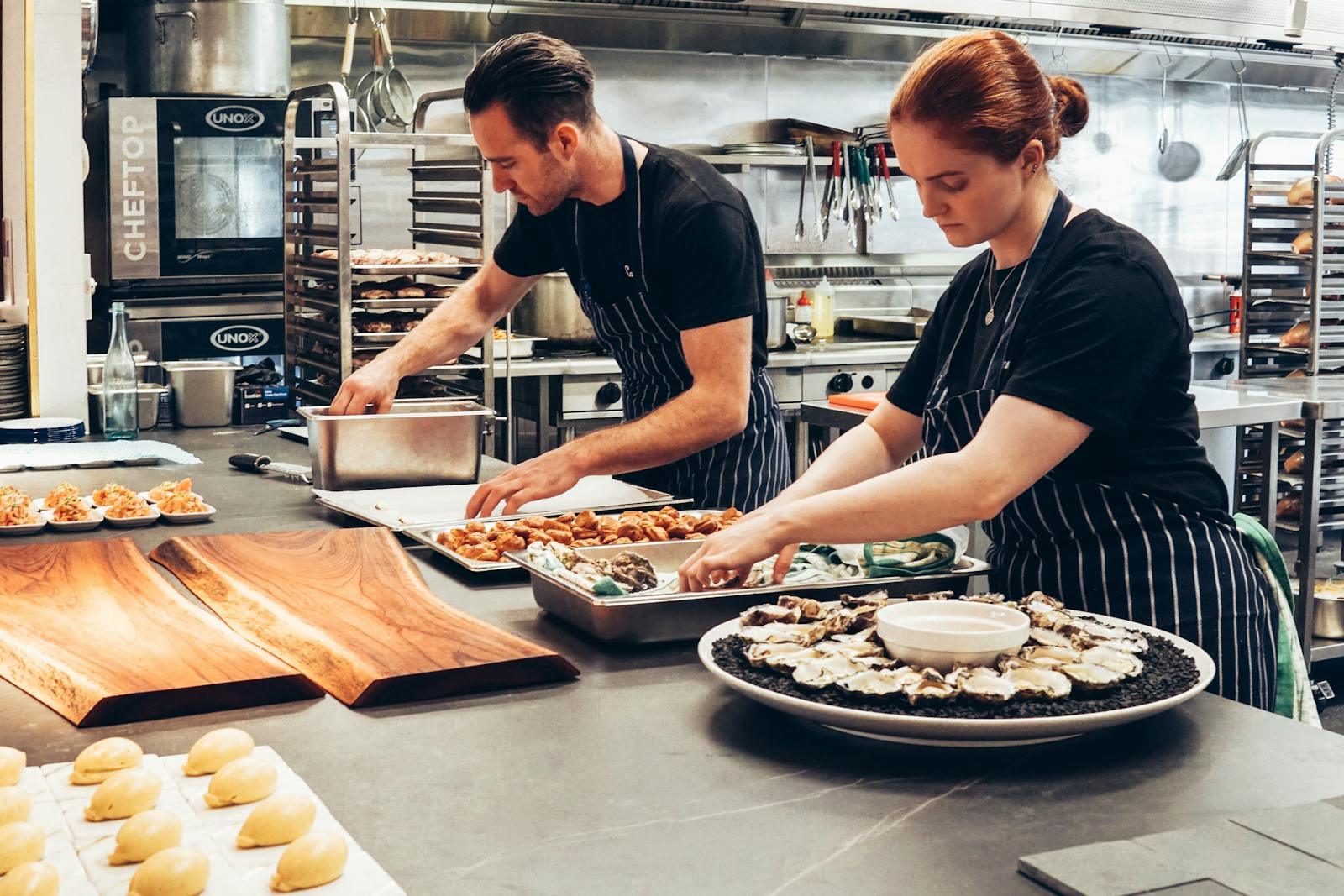Detroit’s food scene is alive and well — from food trucks lining Eastern Market on Saturdays to boutique caterers serving weddings at the Detroit Opera House. If you’ve been dreaming about starting a catering business in the D, 2025 is a great time to make your move. The demand for event catering — weddings, corporate lunches, nonprofit fundraisers, and even private chef services — is climbing steadily, thanks to Detroit’s growing tech sector, revitalized downtown, and a rising population of young professionals who want quality food for their events.
This Detroit catering business guide is here to walk you through everything you need to know — from licensing and permits to renting commissary kitchens, getting insurance, marketing your services, and scaling your operation when you’re ready. Whether you’re a talented home cook or a seasoned chef ready to go solo, consider this your roadmap to building a profitable catering business in the Motor City.
Why Start a Catering Business in Detroit?
Detroit’s food industry is more vibrant than it’s been in decades. According to the Michigan Restaurant & Lodging Association, the state’s food service industry is projected to grow another 8% by 2026, with catering making up a significant share. Corporate offices in Downtown, Midtown, and Corktown need reliable lunch catering; Detroit’s booming wedding industry (nearly 13,000 weddings annually in the metro area) creates steady seasonal demand; and private event catering continues to thrive as residents plan milestone birthdays, graduations, and family reunions.
If you can combine great food with dependable service, Detroit is full of opportunity. And compared to larger metro areas like Chicago or New York, startup costs here can be significantly lower — commercial kitchen rental is more affordable, and local suppliers are plentiful.
Step 1: Get Legal — Licensing, Permits, and Business Setup
The first stop in any Detroit catering business guide is the legal checklist. You can’t just start selling catered meals from your home kitchen — Michigan law requires commercial preparation and proper licensing.
Register Your Business
Start by choosing a business structure (sole proprietorship, LLC, or corporation). Many catering entrepreneurs in Detroit choose an LLC for liability protection. You can register through Michigan’s LARA (Licensing and Regulatory Affairs) online portal.
Catering Permits in Michigan
You’ll need a Michigan Food Service Establishment License, issued by the Wayne County Health Department. Inspectors will check your kitchen facility (or commissary kitchen) for compliance with food safety standards.
Catering Insurance
Don’t skip this step. General liability insurance is essential, and most venues won’t let you cater on-site without a certificate of insurance. You might also need liquor liability coverage if you plan to serve alcohol.
Step 2: Secure a Commercial Kitchen
One of the most common hurdles new caterers face is finding a legal place to cook. Michigan law prohibits most home kitchens from being used for catering, which is why commissary kitchens and rental kitchens are so valuable.
Detroit Kitchen Connect
This local program helps food entrepreneurs access licensed kitchen space across the city at affordable hourly rates. Kitchens are available in Eastern Market, North End, and other neighborhoods. It’s perfect for startups testing the waters before investing in a private kitchen.
Other Commissary Kitchen Options
Private shared kitchens, church kitchens, and restaurant kitchens that rent out during off-hours can also work. Make sure your agreement allows catering production, not just light prep.
Step 3: Build Your Menu and Pricing Strategy
Your menu is your calling card. Detroiters love diverse flavors — from classic BBQ and soul food to Mediterranean mezze and vegan comfort dishes. Decide if you’ll focus on wedding catering, corporate catering, food truck catering, or all of the above.
Costing and Pricing
A good rule of thumb: food costs should be around 30–35% of your price per head. Don’t forget to factor in labor, rentals, and transportation. Detroit’s competitive market means you can’t underprice yourself — sustainability matters.
Step 4: Market Your Business Like a Pro
Even the best chef in Detroit won’t get booked without visibility. Here’s how to get your catering business noticed:
Professional Branding: Invest in a simple website with your menu, pricing, and photos. Include SEO-optimized copy featuring “Detroit catering” and your niche (weddings, corporate lunches, etc.).
Social Media Presence: Post behind-the-scenes kitchen shots, client testimonials, and event highlights. Instagram and TikTok are particularly strong channels for food businesses.
Partnerships: Build relationships with Detroit wedding planners, event venues, and local breweries — they can become your best referral sources.
Step 5: Operations, Staffing, and Logistics
Catering is more than cooking — it’s logistics. You’ll need systems for orders, delivery, setup, and staff scheduling.
Staffing: Start small with a few trained servers or bartenders. For large weddings, Detroit staffing agencies can provide event professionals on demand.
Transportation: Invest in insulated carriers and reliable vans. Detroit winters can be brutal — temperature control is key for food safety.
Software: Tools like HoneyBook or CaterZen can streamline proposals, invoicing, and scheduling.
Scaling Your Detroit Catering Business
Once you’re consistently booked, think about expansion:
Food Truck Catering: Many Detroit caterers add a food truck to serve pop-ups at Eastern Market, Midtown festivals, or corporate events.
Dedicated Kitchen or Event Space: Graduating from a shared kitchen to a private facility gives you more flexibility.
Corporate Contracts: Secure recurring accounts with Detroit companies for weekly lunches — a reliable revenue stream.
Hiring a Sales Manager: If you’re still doing all the selling yourself, consider bringing on help to grow bookings.
Common Mistakes Detroit Caterers Should Avoid
Skipping Permits: Wayne County health inspectors will shut you down if you operate without licensing.
Underpricing: Many new caterers forget overhead costs. Price to make a profit.
Poor Logistics: Delivering cold food or missing setup deadlines is the fastest way to lose clients.
Neglecting Reviews: Detroit customers rely on Google and Yelp. Ask happy clients to leave feedback.
Detroit Catering Business FAQs
How much does it cost to start a catering business in Detroit?
Startup costs range from $5,000–$20,000 depending on equipment, kitchen rental fees, and marketing spend.
Do I need a food truck to cater events?
No — many caterers work from commissary kitchens and deliver by van. Food trucks are optional but can expand your reach.
Can I run a catering business from home in Michigan?
Generally, no. You need a licensed commercial kitchen unless you’re producing cottage foods (non-potentially hazardous items like baked goods).
What’s the best kitchen rental option for beginners?
Detroit Kitchen Connect is a great starting point, offering affordable and flexible rental space.
Do I need special permits to serve alcohol at events?
Yes. You’ll need a catering liquor license through the Michigan Liquor Control Commission.
Final Thoughts: Build Your Dream Food Biz in the D
Detroit is a city that celebrates hustle, creativity, and great food. Starting a catering business here isn’t easy — but with the right mix of passion, planning, and persistence, you can build something truly sustainable. From securing the right kitchen to crafting a menu that reflects Detroit’s flavor, your journey can feed both your community and your bank account.
Ready to take the next step? Visit DetroitCityNews.com for more business resources, local entrepreneur interviews, and step-by-step guides to building your future in the Motor City.















